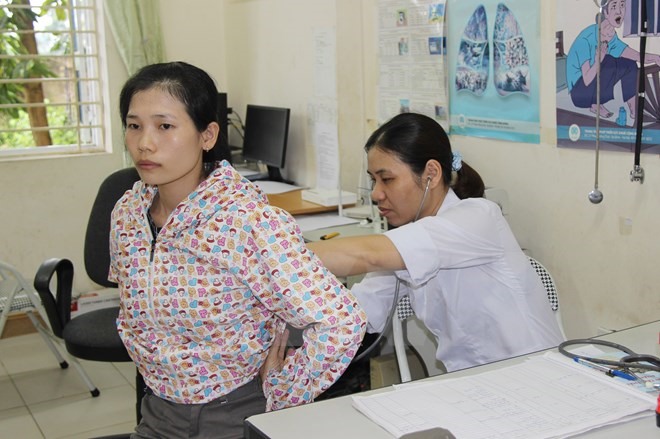People to benefit from basic healthcare package
 |
| A local resident receives a health check-up at Thái Nguyên Province’s Tân Hương Commune. - Photo vietnamplus.vn |
The package, including prevention, consultation and treatment services for all citizens, is fully covered by Việt Nam Social Security.
According to the agency’s data, only 19 per cent of health insurance card holders register commune-level medical facilities as their initial places for examination and treatment, while only three per cent of the social insurance fund pays for medical services at those centres.
The shortage of services and skilled medical staff is the main reason for this phenomenon. Therefore, the Ministry of Health (MoH) and the Việt Nam Social Security collaborated to develop this basic medical services package as a solution.
Thereby, people can access 76 basic services and 241 types of medicines at commune-level medical facilities.
Through the package, diabetic patients, instead of going to hospitals, can receive medicines at local medical centres.
Đoàn Văn Bôn, a diabetic patient in northern Hải Dương Province, is interested in this initiative. “Since the district hospital is seven kilometres away from my house, I miss appointments sometimes. Therefore, it is more convenient for me that near-by medical centre start distributing necessary medicines,” he said.
Schools also stand to benefit from the policy. As kindergartens and primary schools are commonly located next to medical facilities, students can access better medical services.
According to Lê Văn Khảm, head of the Social Insurance Department under MoH, that the basic medical services package also helps people save money and motivates local medical facilities to enhance their capabilities.
With all expenses paid by the State budget and local budget, the initiative aims to satisfy 70 per cent of people’s healthcare demands at local medical facilities. At present, the related agencies are planning to review the quality of medical services.
Moreover, Bằng recommended proposing further policies to support subordinate medical facilities such as doctor rotation or satellite hospitals.
Vietnamese people have to pay 40 per cent for medical expenses while, according to the World Health Organisation, a medical system becomes unequal when it requires people to pay more than half of medical expenses. The reasonable rate recommended is 30 per cent. Việt Nam plans to reduce it to 35 per cent by 2020.
What the stars mean:
★ Poor ★ ★ Promising ★★★ Good ★★★★ Very good ★★★★★ Exceptional
Latest News
More News
- Congratulations from VFF Central Committee's int’l partners to 14th National Party Congress (January 25, 2026 | 09:46)
- List of newly-elected members of 14th Political Bureau announced (January 23, 2026 | 16:27)
- 14th Party Central Committee unanimously elects To Lam as General Secretary (January 23, 2026 | 16:22)
- List of members of 14th Party Central Committee announced (January 23, 2026 | 09:12)
- Highlights of fourth working day of 14th National Party Congress (January 23, 2026 | 09:06)
- Press provides timely, accurate coverage of 14th National Party Congress (January 22, 2026 | 09:49)
- Press release on second working day of 14th National Party Congress (January 22, 2026 | 09:19)
- Minister sets out key directions to promote intrinsic strength of Vietnamese culture (January 22, 2026 | 09:16)
- 14th National Party Congress: Renewed momentum for OVs to contribute to homeland (January 21, 2026 | 09:49)
- Party Congress building momentum for a new era of national growth (January 20, 2026 | 15:00)
















 Mobile Version
Mobile Version